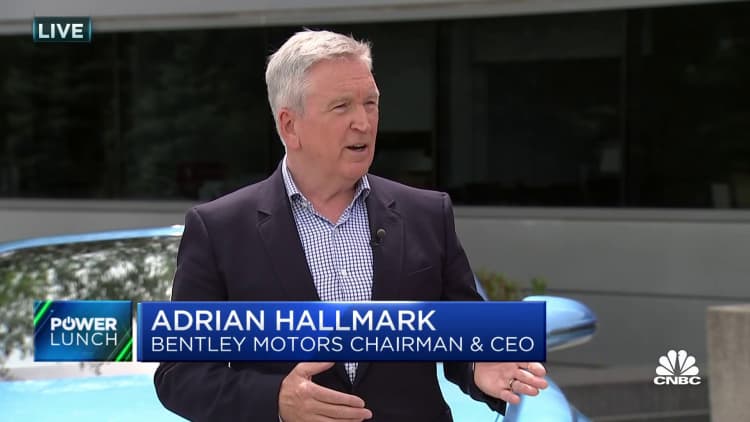
Bentley Continental GTC Speed in Kingfisher.
Adam Jeffery | CNBC
Bentley Motors is pushing back its plans to exclusively offer all-electric vehicles by the end of this decade due to changing market conditions and a delay in its first EV.
CEO Adrian Hallmark said the famed British luxury carmaker remains committed to carbon neutrality and exclusively offering EVs, but it now plans to do so a couple of years later. Bentley will continue offering plug-in hybrids alongside BEVs, or battery electric vehicles, past its previous target of 2030, Hallmark said.
“Whether we deliver all the BEVs by 2031 or not, we still may have some hybrids that we wouldn’t have had post-2030,” he said during a media briefing. “But not for 10 years, maybe just for a couple of years as we run them out.”
Bentley is among a growing number of automakers to change, delay or cancel ambitious EV plans as global adoption grows slower than many expected.
Bentley’s first EV was expected to be released next year, followed by one new all-electric model each year as part of a plan to invest $3.4 billion by 2030. The company now expects its first EV to be released in 2026, pushing back the release of the subsequent vehicles as well.
Bentley CEO Adrian Hallmark.
Scott Mlyn | CNBC
The delay in Bentley’s first all-electric vehicle was the result of software issues as well as difficulty with developing the vehicle’s architecture to Bentley’s standards, according to Hallmark. He said those challenges were the primary driver behind delaying its EV plans, rather than the changing market conditions.
Hallmark said Bentley will increase its investment in plug-in hybrids by hundreds of millions of dollars in the years to come. He said given the increase in investment, the company needs to “run them a bit longer” to achieve a desired return on investment.
Bentley currently offers plug-in hybrid versions of its Bentayga SUV for $203,200 and its Flying Spur sedan for $221,200. Both include engines as well as EV components and electric range.
Bentley still plans to end production of traditional internal combustion engines, including its famed V-12 engines next month and nonhybrid V-8s by July or August.
A staff member checks a Bentayga SUV on the Bentley production line at its factory in Crewe, England, on Dec. 7, 2022.
Phil Noble | Reuters
The update to Bentley’s EV plans was announced alongside the Volkswagen-owned company’s 2023 financial results.
Those results include deliveries of 13,560 vehicles globally, down 11% from a record of nearly 15,200 vehicles in 2022. Revenue was $3.21 billion, down 13% compared to the previous year, with an operating profit of $644.7 million, down 17%.
Hallmark called 2023 a great year for the company but also “a year of massive swings in performance across the overall luxury” market that affected business. He cited challenges including changing sales dynamics in China as well as macroeconomic concerns and higher interest rates for its 30% of buyers who lease their vehicles.
Bentley’s 2023 performance significantly outperformed 2021, when it sold more vehicles but at a lesser profit. Hallmark said the increase in revenue and profits compared to two years ago is a direct result of customers opting for more customization and add-ons to their vehicles.








